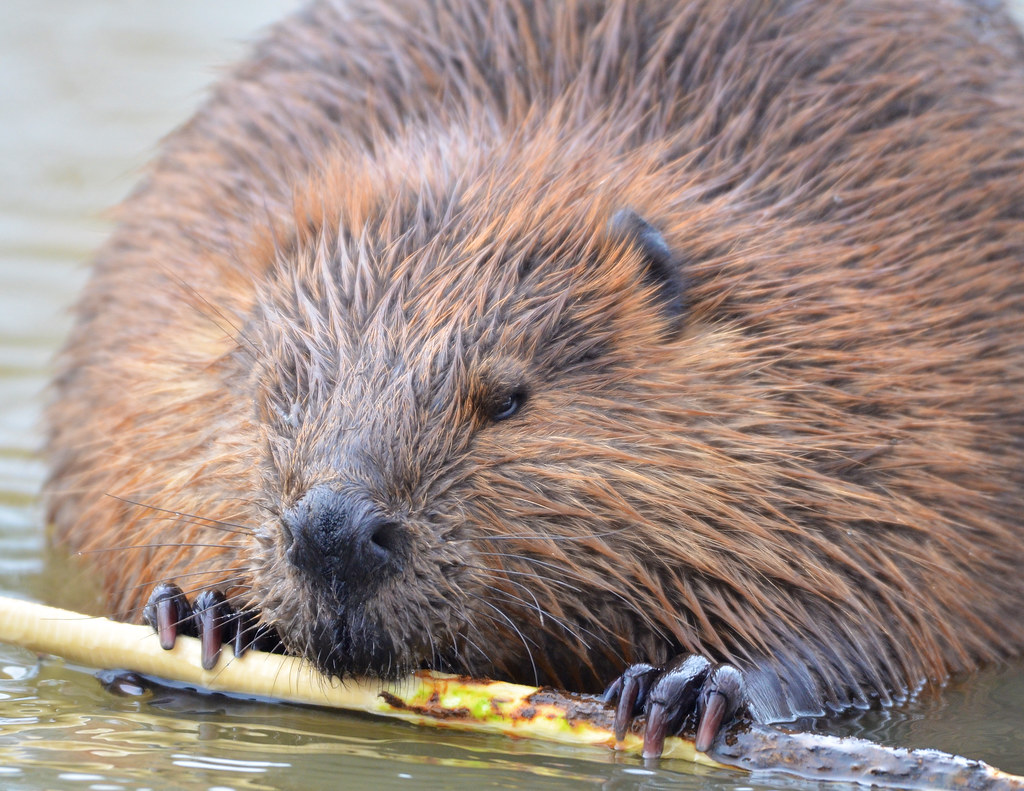
(Jen Goellnitz/CC BY-NC 2.0)

(Jen Goellnitz/CC BY-NC 2.0)
Elyssa Kerr’s initial impression of beavers was not one of appreciation. The focus of her work with the Washington Conservation Corps was salmon habitat recovery, and beavers frequently wreaked havoc on the tree-planting projects. She spent the majority of her days tearing out beaver dams, challenged by how quickly beavers can build. However, her irritation eventually blossomed into appreciation.
She experienced firsthand a beaver’s ingenuity. The beaver built a dam, but in doing so, constructed a new ecosystem: a wetland habitat that thousands of species rely on, making the beaver a keystone species.
In the face of climate change, the beaver’s ecological engineering has the potential to preserve and foster vital ecosystems against its effects. Wildfires and droughts are plaguing various regions, waters are warming, and snowpack is shrinking. Beavers offer a natural combatant against these worrisome trends. The dams they build slow, spread, and store water, creating ponds and wetlands that maintain water supplies, providing resilience to droughts and fires. Riparian vegetation is able to access this stored water during dry phases, protecting the areas from droughts.

A study containing data from five wildfires published in the Ecological Society of America concluded that “beaver-dammed riparian corridors are relatively unaffected by wildfire when compared to similar riparian corridors without beaver damming… results indicate that beaver damming plays a significant role in protecting riparian vegetation during wildfires, and that this is a consistently observable phenomenon across landscapes.”
Now, Kerr is the Executive Director for Beavers Northwest, and works to ensure that beavers remain on the landscape to protect the ecosystems they build. Most of the time, this involves resolving conflict between beavers and property owners.
When a beaver builds a dam and creates a wetland, the area becomes flooded. Unfortunately, this can flood a home or business owner’s property if they are located close to the water source. The longtime solution has been to trap and kill the beaver to protect assets from damage.
Beavers Northwest offers an alternative solution, one that protects both the beaver and the property. Usually, flow devices are installed, the most common being the pond leveler. Kerr explains it as, “essentially, a pipe through the dam. We set the pipe at a level that’s a good compromise between the needs of the people and the needs of the beavers and the wetlands they’ve created. The pipe is now the dam height and pond level.” If the beavers build the dam higher, the pipe will drain the water downstream to prevent an increase in the pond’s water level and avoid flooding.
Kerr is happy with the success Beavers Northwest has experienced in the Seattle, Washington area, and is pleased with the landowners’ willingness to work with them. According to Kerr, “most people call us. They want an alternative to trapping.”
Across the country, the Beaver Institute is experiencing similar success. With their Beaver Core program, they are taking it a step further by offering a training program for people to become certified Beaver Core wetland professionals to install the flow devices. Adam Burnett, the Beaver Institute’s Executive Director, explains, “the goal of the Beaver Institute is to be a national organization that works locally. We do that through our Beaver Core program. Our goal, ultimately, is to have someone trained in these techniques within 100 miles across North America, wherever anyone might be having beaver issues.” The Beaver Institute also offers a cost share program, with grants available to assist homeowners with the cost of installing the flow devices.
The Beaver Institute is also focused on policy. Biennially, they host an international conference called BeaverCON, for “professionals, researchers, and practitioners to learn what works in beaver conflict management and watershed restoration.” From this conference sprouted the Climate Change Beaver Coalition. A collection of nonprofits, individuals, and researchers, the coalition is focused on urging those in positions of power toward progressive beaver policy that avoids removing or killing beavers. Recently, California has approved a budget request for $1.67 million from the California Department of Fish and Wildlife to “fund and support the implementation of a beaver restoration program within the Department” for the fiscal year 2022-2023.
Known for their bright orange teeth, gnawing of wood, and dam-building, beavers are an unsuspecting partner in mitigating the effects of climate change. Homeowners and farmers often see them as a pest to get rid of, but efforts by Beavers Northwest and the Beaver Institute have made progress in changing this perception. Now able to offer a new solution to the conflict between beavers and property owners, both Kerr and Burnett are confident the future is bright for beaver preservation. A necessity, when mitigating the effects of climate change.